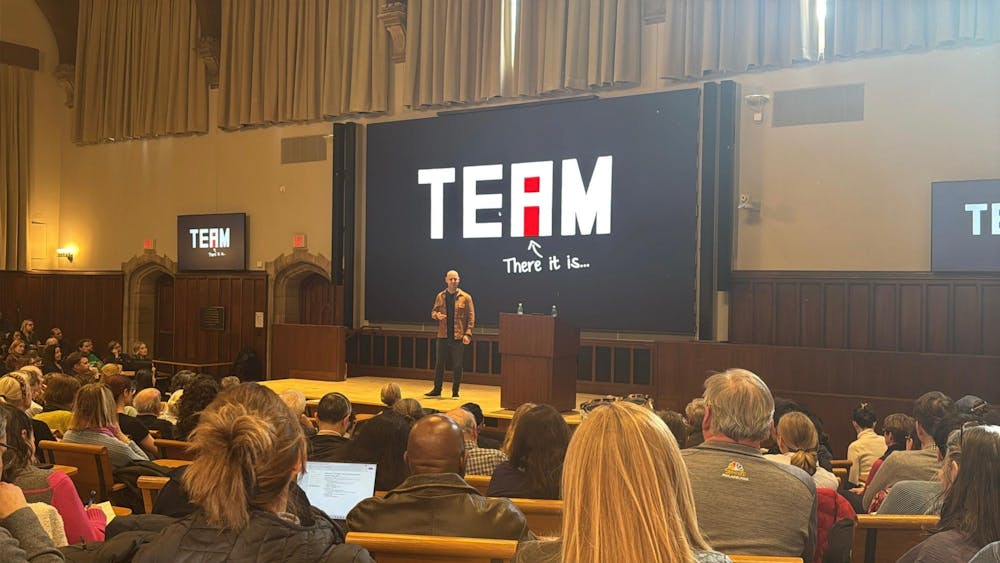More than 350 Princeton University undergraduates, graduate students, faculty, alumni, and local community members filled McCosh 50 on Tuesday to hear renowned organizational psychologist and bestselling author Adam Grant speak.
Grant, known for his research on rethinking, generosity, and human potential, delivered a talk titled “Think Again: The Power of Knowing What You Don’t Know.” The event was hosted by the Stafford Little Lecture series and sponsored by GradLectures.
Established in 1899 through a $10,000 gift from Stafford Little, Class of 1844, the Stafford Little Lectures support public talks at Princeton University, bringing prominent intellectuals to campus.
“When [Professor of Sociology] Matthew Desmond asks, you answer,” Grant told The Daily Princetonian following the lecture.
“I thought the crowd was full of thought-provoking questions and impressive levels of engagement and curiosity. It makes me think I should spend more time at Princeton,” Grant said.
Grant is the author of six bestselling books, including “Think Again,” “Hidden Potential,” and “Originals.” Grant hosts the TED podcasts “Re:Thinking” and “WorkLife,” with over 90 million downloads and has a following of more than 10 million on social media.
Grant opened his lecture by recounting early misjudgments — including passing up an investment opportunity in Warby Parker and dismissing Facebook’s potential while an undergraduate at Harvard.
“I made a bunch of assumptions that seemed true, but they were actually false,” Grant admitted. “It was not the first time that I had struggled to rethink something that I believe deeply, and maybe some of you have these struggles.”
Grant started his talk by saying how the smartest people in the room are most at risk. Grant warned that intelligence can become a trap: “The smarter you are, the harder it is to recognize your own limitations,” he said. “The smartest people in the room are in the greatest danger of becoming dumb.”
This led to one of the lecture’s central points: rethinking is not the opposite of intelligence but a crucial part of it. Drawing on psychological research, Grant explained that intellectual humility and the willingness to revise one’s beliefs are essential traits of effective thinkers and leaders.
“Adam Grant’s TED talks and podcasts provide beneficial information on leadership, productivity, and general habits in an easy-to-digest format,” Gavin Molloy ’25 wrote to the ‘Prince’ afterwards. “Attending his presentation was a no-brainer for me.”
“While his presentation itself was great, what struck me most was his ability to answer difficult questions in a funny yet meaningful manner,” he added.

Grant went on to outline the five personas in argument and belief: the preacher (“I’m right”), the prosecutor (“You’re wrong”), the politician (“We’re right, they’re wrong”), the cult leader (“I’m always right”), and finally, the scientist (“I might be wrong”). The scientific mindset, he argued, is the one most conducive to learning, innovation, and growth.
He encouraged the audience to think like scientists — treating opinions as hypotheses, ideas as experiments, and criticism as data.
Much of the talk centered on the concept of psychological safety — a workplace or social environment where individuals can express dissent, admit mistakes, and ask questions without fear of shame or retribution.
“Criticizing yourself out loud is one of the best ways to invite honest feedback,” Grant said, sharing that he starts his own courses by reading out harsh anonymous evaluations from past students. “I take my work seriously and my growth seriously, but not my ego.”
Another key idea was the “challenge network” — a group of people who are willing to tell you uncomfortable truths. These individuals, often “disagreeable givers,” are not necessarily warm or polite, but they care enough to question your thinking.
“The people who disagree with you and still care about you are the most valuable voices to have around,” Grant said.
He offered practical tools for identifying takers—those who aim to extract value without giving in return and advised asking them to estimate how many others would act unethically in a given scenario. “People tend to project. The takers think others steal because they do,” he explained.
During the Q&A, students and community members asked about how to distinguish between rethinking and overthinking, how to influence disagreeable colleagues, and how to build resilience when morale is low.
Hiren Bhatt, a local community member, said he especially enjoyed the back-and-forth between Grant and the audience.
“Unlike many lectures, a lot of time was spent on question answers,” Bhatt said. “I think these are the typical issues that people deal with within their organization or work often. I think that was an informative and actionable session.”
“The difference between overthinking and rethinking is that overthinking doesn’t bring in new perspectives,” Grant said. “Rethinking means applying new lenses.”
Grant also challenged traditional views of leadership. “We live in a world that still values the Great Man theory,” he acknowledged, “but some of the most effective leaders are the ones who lead with vulnerability and curiosity.”
Grant closed with a story about the late Nobel laureate and Princeton professor Daniel Kahneman, who once approached him after a talk saying, “That was wonderful — I was wrong.” Grant called it a “lightbulb moment,” describing Kahneman’s joy not in being wrong, but in learning something new.
“It’s the only time you can be certain you’ve learned something,” Grant said. “Being wrong can be a source of joy.”
Hayk Yengibaryan is an associate News editor, senior Sports writer, and education director for the ‘Prince.’ He is from Glendale, Calif.
Please send any corrections to corrections[at]dailyprincetonian.com.








